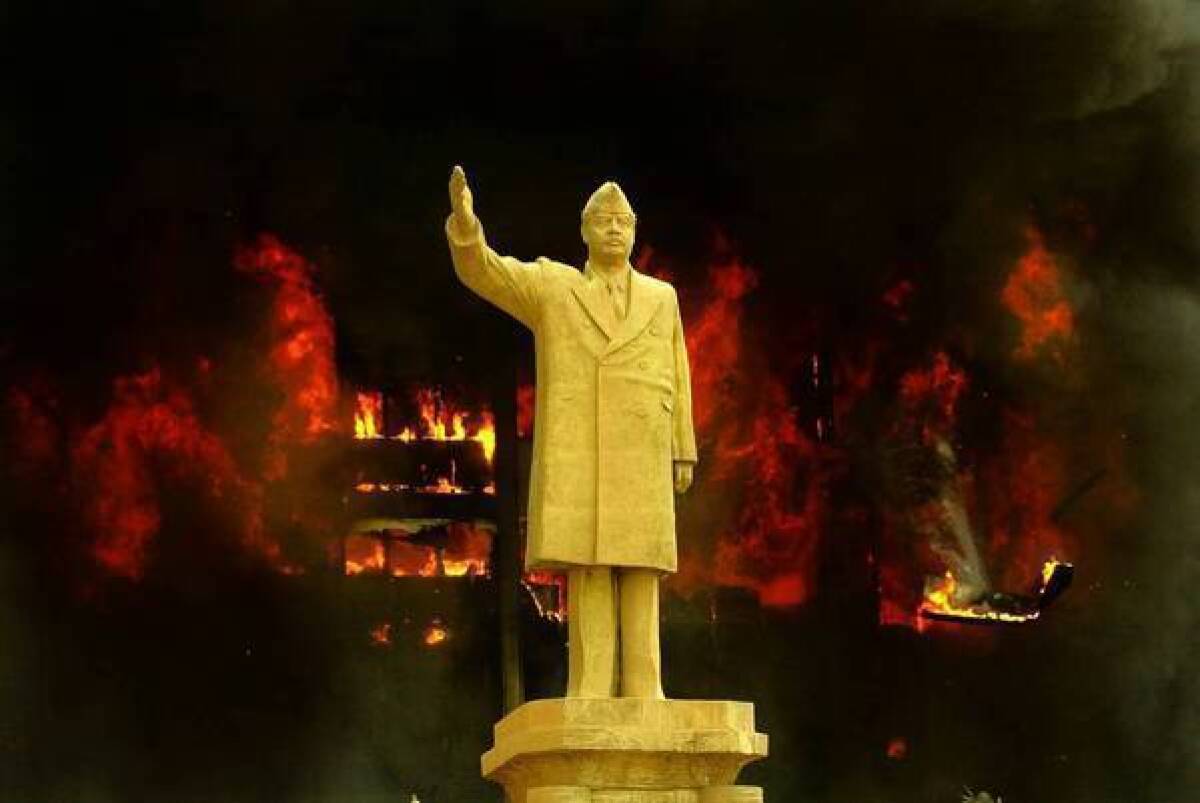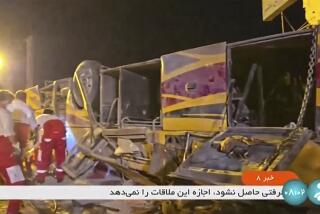In Iraq, 10 years after U.S. invasion, legacy of war lives on

BAGHDAD — A bronze statue of a slain Shiite Muslim cleric greets motorists as they drive down the airport highway that invading convoys of American troops once used to charge into Iraq’s capital. The new artwork replaced a mural commissioned by Saddam Hussein and demolished after the U.S.-led invasion that began a decade ago Wednesday.
Across Baghdad, billboards of Shiite Islamist leaders have taken the place of once-ubiquitous portraits of Hussein in prayer, Hussein holding flowers and Hussein carrying a rifle.
They are ready reminders of how Baghdad has changed since March 20, 2003.
PHOTOS: 10 years after U.S. invasion
When President Bush ordered U.S. forces to topple Hussein and his Sunni Arab-dominated Baath Party, most Iraqis welcomed the action. Hussein was blamed for disastrous wars, crippling poverty and rampant human rights abuses, particularly against members of Shiite religious parties.
In the aftermath, Shiite and Sunni Islamists sought to dominate Iraq’s public life, touching off lengthy, all-out sectarian warfare. Over time, the Shiite majority won out at the ballot box and on the streets.
Now, after a war that claimed the lives of 4,486 Americans and more than 100,000 Iraqis, the American military is gone. Its huge embassy sits like a relic in the fortified Green Zone.
Except for pockets such as Sunni-dominated Anbar province west of Baghdad, and Nineveh and Salahuddin provinces to the north, the ascendancy of the Shiites — with the increased influence of Shiite-dominated Iran — is nearly complete.
Sunni neighborhoods are tucked behind corral-like concrete walls that help the government control what it considers to be a restive population. Checkpoints are no longer found around now-relatively prosperous Shiite neighborhoods, where families escape the city’s tension at Western-style restaurants with hamburgers and chocolate ice cream.
Some Shiites exult in their political and military triumph. But others wonder whether their new world is that much better than the one left behind. Are the leaders from their own sect consigning them to a future of chronic political violence, corruption and lack of freedom?
The American presence is a distant memory. But the legacy of the war is on display on every street corner and in the halls of power.
One such place is the Baghdad provincial council office, heavily damaged in a bombing by Sunni extremists in 2009.
The building, formerly Hussein’s Information Ministry, has the look of a shabby dungeon. Dim lights shine on a ground floor room; ordinary Iraqis wait on plastic seats to petition the city’s rulers.
A Shiite religious student, waiting to ask a councilman for money for his studies, removes his dentures and opens his shirt to show the thin white scars from the shrapnel that ripped his body in a 2003 car bombing. The student, who declined to give his name because he is suspicious of Westerners, said he hopes someone will listen to his plea.
Dozens of war-injured men and women are desperate to meet government officials, who operate behind phalanxes of security and seldom assist anyone outside their immediate circle. The student slumps in his chair, glancing at a legless man in a cheap plastic wheelchair waiting pointlessly like him.
Upstairs, a polite civil servant with silver hair sits behind a desk. Four months earlier, he was driving his car when a vehicle pulled up and let out a burst of gunfire. The bullets grazed his skull twice, and three struck his right knee. Doctors told him he should seek medical treatment abroad, but he could not afford it.
At the end of each day, he says, he returns to his simple apartment with a clean conscience. “I serve my people for free. I am not corrupt like the others,” he says, asking to remain anonymous for fear of losing his job.
The chairman of the provincial council, Kamal Zaidi, has an office on the same floor. A slight man in a powder gray suit, he believes his country has pulled through its darkest times.
His two brothers were arrested in 1982 for belonging to a Shiite political group, of which he is also a member. They disappeared and their bodies were never recovered.
Zaidi coolly described his life as a fugitive in the 1990s, battling Hussein until he was thrown into Abu Ghraib prison for two years. Now, he says, the government is building homes for poor and displaced families, and the future is bright.
“The change that happened here is a dream for all Iraqis,” he said, praising God.
Far from Zaidi’s offices live many of the foot soldiers who fought the street wars in 2006 against Sunni gangs for control of the capital.
In the Sadiya neighborhood, a man with thinning hair and a rough beard enters a barbershop called New Style, whose sign shows a teenage boy with spiked hair.
The customer said he fought against the Americans during their occupation of Baghdad and joined the war against the Sunnis when he felt that the Shiites were under siege.
A musician, he calls himself the Maestro but declines to give his real name for his safety, he says. But his willingness to talk about the past seems to make the teenage barbers uneasy. They say they’d prefer to forget the past.
They tell him to be quiet, but the customer doesn’t care; he said he has paid his dues and will say whatever he wants.
“The Shiites won,” he says, “I feel we are strong.”
But in Sadr City, the heart of working-class Shiite Baghdad, where more than 3 million people live in cramped conditions, many others have serious misgivings.
A Shiite tribal leader participates in a news conference denouncing Sunni protests against the national government. But later, in the privacy of his home, he acknowledges that Iraqi security forces and the judiciary are politicized and that the government is filled with officials lining their pockets.
“The government is not satisfying the people,” he says. “They offer them nothing. The western provinces have the right to stand up.”
Yet he fears that a deal with the Sunnis would lead to people like Hussein returning to power. “It’s better to have something on our plate,” he says, “rather than nothing.”
Rasoul Hussein Diwan owns a cigarette shop at the entrance to the bustling Karada commercial district, across from the national theater. He says his family was regularly harassed because one of his cousins had been involved in a Shiite political party.
Diwan, 41, expected to remain a day laborer until he died because his family was Shiite. But after the fall of Hussein, he was able to open three cigarette shops around Karada.
But, one evening six years ago, he was headed to his car when three men in Iraqi military uniforms pulled up next to him. He was handcuffed, blindfolded, locked in a room and beaten for eight days. He has no doubt that they belonged to the Iraqi army and had the political backing to run their own criminal racket.
His family paid a $40,000 ransom to secure his release. He now stands warily behind the counter from morning until night.
On Fridays, he brings his son Hamza, 7, to work. His son has a heart problem and Diwan keeps him home from school.
Diwan says he is angry at the government for not doing enough to provide decent medical care. His son didn’t get a proper diagnosis until he took him to India at age 3. Doctors told him the heart would never heal because he had not received better treatment earlier.
Diwan doesn’t know what tomorrow will bring. Law and order could break down, and those who tortured him before could come again, he says. But worrying isn’t an option. His goal is to make it to the weekends, when he can sleep in and play with his son.
“I just try to forget and move on,” he says.
More to Read
Sign up for Essential California
The most important California stories and recommendations in your inbox every morning.
You may occasionally receive promotional content from the Los Angeles Times.










